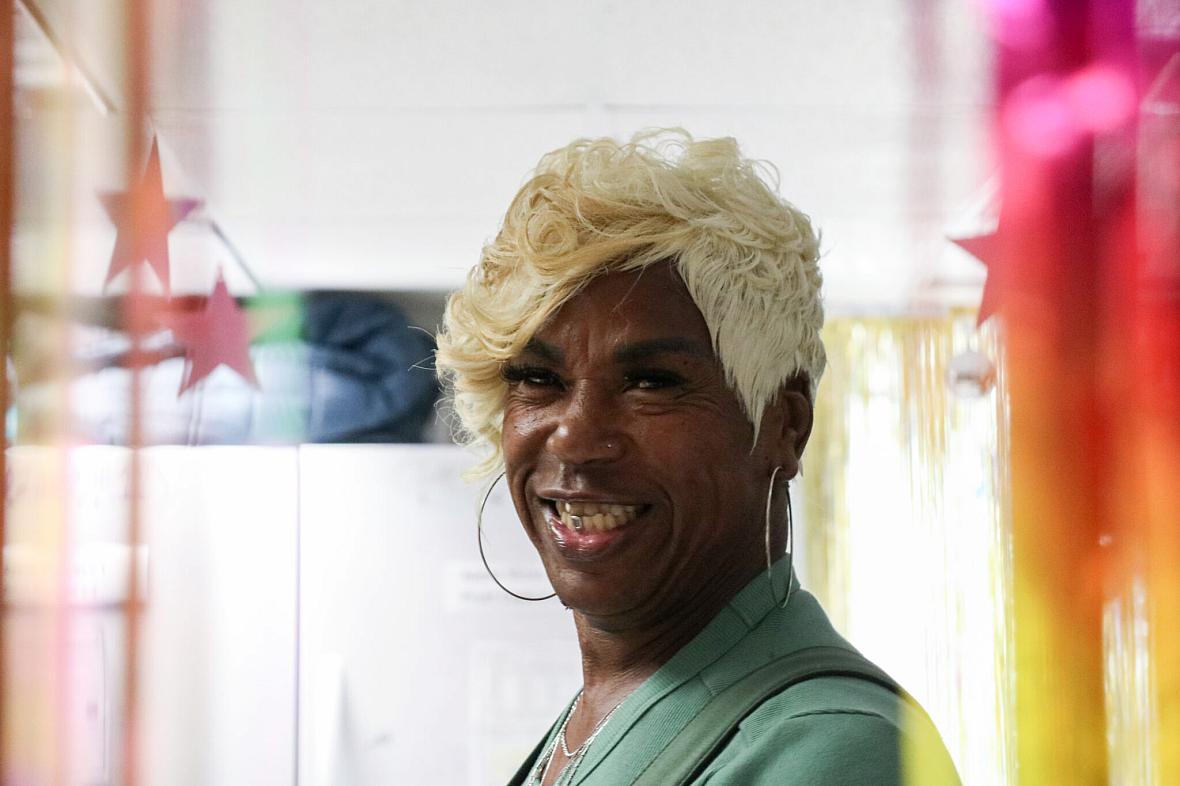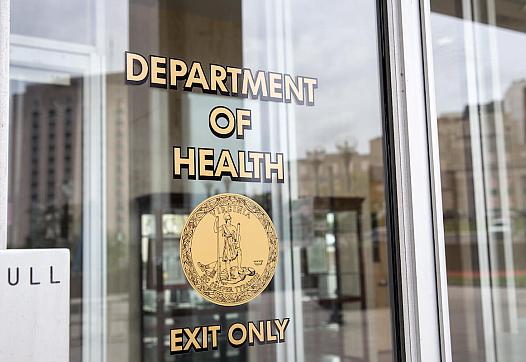Virginia patients, nonprofits cope with loss of federal funding for HIV/AIDS patients
The story was originally published by Virginia Mercury with support from our 2025 Impact Fund for Reporting on Health Equity and Health Systems.

Shay Tucker stands in LGBT Life Center’s free pantry in August 2025. Amid various federal funding cuts to public health, Tucker maintains her smile and volunteers her time at the nonprofit organization that has supported her throughout the years in living with HIV.
(Photo by Charlotte Rene Woods/Virginia Mercury)
Shay Tucker — a trans woman who overcame homelessness and is living with HIV — smiled as she walked into the LGBT Life Center in Norfolk, her presence and speech imbued with upbeat energy. She credits the center and similar nonprofits, which rely on a federal funding stream that began to dry up this summer, with revitalizing her life.
Tucker previously faced mental health challenges, depression, drug dependency and struggles to live authentically as herself. She and others have utilized the center’s services, ranging from an in-house pharmacy to counseling to housing assistance for LGBTQ+ communities in Hampton Roads, to help them get back on track and gain the strength to keep trying.
“Being homeless, you do things that you don’t want to do. It leads us to prostitution and stealing and doing things that are not legal so that you can rent a room or you stay with someone for the night,” Tucker said. “I know what I went through and what I had to do to survive.”
The center and similar groups are bolstered by the Ryan White Fund, money appropriated annually by Congress to treat and manage Human Immunodeficiency Virus (HIV) for those who can’t afford the care through private providers. Treatment is important to help minimize further spread to others and keep the virus from progressing to Acquired Immunodeficiency Syndrome (AIDS).
The name of the fund also serves to combat longstanding stigmas surrounding the disease, which ravaged LGBTQ+ communities decades ago. First created in 1990, the program was named for a young man who’d died after contracting the disease from a blood transfusion when he was 13. The funding’s ability to address both people’s access to treatment as well as factors that contribute to their health has helped prevent the continued spread of HIV and given patients a second chance at life.
A September 2025 John Hopkins analysis surmised that ending the Ryan White program would contribute to a rise in HIV infections by 49% in the next five years.
The program’s future is uncertain amid a shifting federal funding landscape and organizations like the LGBT Life Center are already reporting strains.
The Ryan White funding is split into several parts, one of which, Part B supports housing assistance and dental care for low-income people. It’s no longer available to most providers in Virginia. As organizations around the state experience that loss, they’re figuring out they can still serve their clients in need.
Nearly five hours west of Hampton Roads’ LGBT Life Center is the Council for Community Services in Roanoke, the sole Part B recipient in Southwest Virginia. As it grapples with a 50% reduction in Part B funding from the $2 million it received last year, it’s bracing to absorb about 400 additional HIV patients from surrounding areas that can no longer receive services.
“We’re operating on scarcity now, so we have to turn to the community and say, ‘this is what we’ve done for you and we’ve been here since the 90s,’” said health services director Todd Rothrock.
The organization gave up its second office location and consolidated into the building that serves as its drop-in center. Rothrock explained that this allowed them to save money and ensure more of it was directed to client services. But it also meant losing seven employees.
Some of the remaining team is struggling personally as well. Peer recovery specialist and HIV patient Teresa Jones still oversees a support group at the Council, despite losing medication assistance she once had.
The Comprehensive HIV/AIDS Resources and Linkages for Inmates fund, dubbed CHARLI, had helped Jones sort through therapy and medications after she left prison. That program, which had been operated by the Virginia Department of Health, ended this summer.
Over time, she became involved with the Council as a peer recovery specialist to help others heal from addictions and now leads a women’s support group. As a survivor of domestic violence, she supports others who may have experienced the same.
Now, without medications to help regulate her mood, she plans out how she spends her time each day to prevent her from leaning on substances to cope.
“I’m having my moments right now,” she said with a sigh. “If it gets too stressful, I call Irene. She’ll put me at ease or we’ll find a project for me to do.”
Irene Bethel-Vineyard, a senior case manager at the Council, nodded with a smile.

Irene Bethel-Vinyard (left), Todd Rothrock (center) and Teresa Jones (right) stand outside of the Council of Community Services drop-in center in Roanoke, Virginia.
(Photo by Charlotte Rene Woods / Virginia Mercury)
A longtime mental health professional who has worked in other parts of the state, Bethel-Vineyard felt drawn to Southwest Virginia so that she could help care for patients having trouble finding transportation in rural areas. She describes her work as a puzzle that’s getting harder to piece together as resources dwindle.
Aside from transportation, case managers at LGBT Life Center in Norfolk and Health Brigade in Richmond emphasize that housing is also critical in helping ensure people can stay on top of their medications.
A funding program called Housing Opportunities for Persons with AIDS (HOPWA), which is similar to the Ryan White program, has been earmarked to end in President Donald Trump’s budget for next year.
“Housing is health care,” said LGBT Life Center housing director Julie Snell. “Without stable housing, you cannot address health care needs or health care barriers.”
Health Brigade case manager Keisha West stressed that obtaining necessary medication becomes lower priority for people when housing and food instability arises.
Ryan White funding has meant critical wraparound services to HIV patients, she said.
“Rent is going up and people’s pay isn’t keeping up,” she said. “People come to us for help and Ryan White-funded clinics are one of the few places people can come. Even if they have Medicaid, people’s finances are stretched.”
State Sen. Jeremy McPike, D-Prince William, first started hearing about how Ryan White was targeted for reductions late last year and wondered if the state would be able to absorb costs. With a background working in public health as a volunteer firefighter and EMT and through his service on the state finance committee, health care is top of mind for him.
As various federal funding cuts were enacted or deliberated by Congress this year, McPike kept track of the different programs the legislature and next governor may agree to support in the legislature’s 2026 budget negotiations.
He’s also monitoring forthcoming changes to Medicaid and hospital funding mechanisms in the reconciliation bill Congress passed this summer. As of mid-October, Congress was at an impasse during a government shutdown, in part, over continued funding of special tax credits that help low-income people purchase health insurance through the Affordable Care Act. Thousands of Virginians stand to lose health care through the changes handed down by national lawmakers this year.
“The domino effect is going to cascade to almost every facet, because people are still going to need treatment and seek care,” McPike said.
For HIV positive people, medication is key to maintaining livelihood and preventing viral spread. Kelly Garrett, one of West’s clients at Health Brigade, has seen what happens when HIV progresses to AIDS.
“I’ve walked behind so many caskets,” she said of people who have succumbed to the disease she has lived with for 57 years.
It’s why she appreciates the role that nonprofit organizations’ support groups and financial assistance can play in helping reduce barriers to access and affordability of life-saving drugs.
West, who shared that one of her clients is in her 80s, added that HIV isn’t necessarily the death sentence it once was. As long as people can access consistent treatment, many patients can go on to live full lives.
The federal funding cuts are hitting West’s clients, however, as she said about half of them have dropped off in recent months. She hopes that the broader public deeply considers the various public health funding shifts and who they directly affect.
But as Ryan White losses impact HIV-positive communities in Virginia, West noted that forthcoming Medicaid changes will influence funding to hospitals and stand to affect the broader public in the years ahead.
“People may not really think about these things until it hits them,” she said.


